【BBC六分钟英语】如何向不认识的人打招呼?
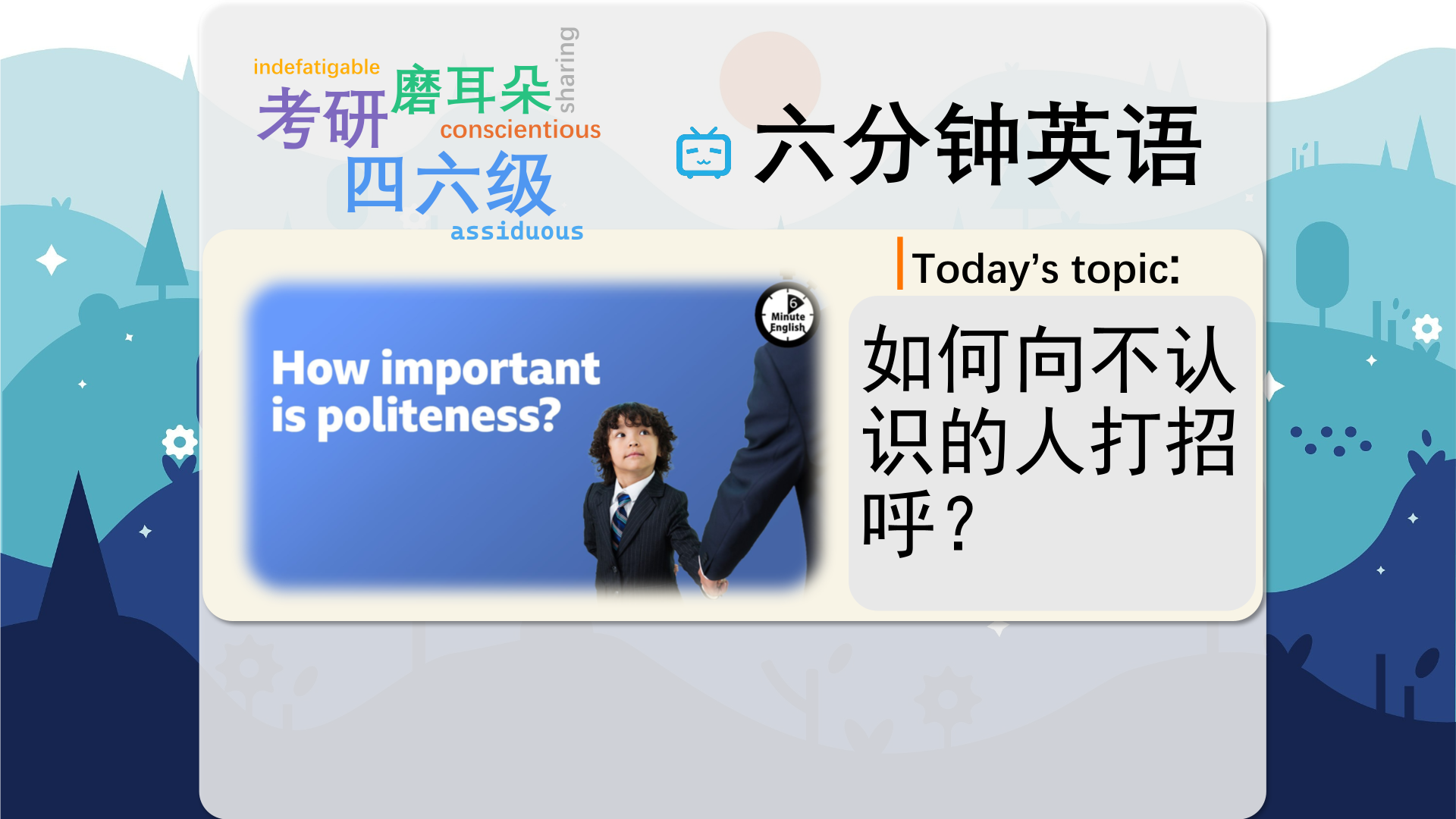
【英文脚本】
Neil
Hello, this is 6 Minute English from BBC Learning English. I’m Neil.
Beth
And I’m Beth. In this programme, we’re talking about politeness. Britain has a reputation for being a polite place where children are told to say ‘please’ and ‘thank you’, but in real life that isn’t always true. You, give me that pen!
Neil
I’m sorry. That was a bit rude.
Beth
Well, what should I have said?
Neil
How about: “Neil, please could you pass me the pen?”
Beth
Fine. Neil, could you please pass me the pen?
Neil
There you go! That’s much better.
Beth
Now listen as BBC Radio 4 presenter Michael Rosen, who is a well-known poet and children’s author in Britain, describes what happened to him one day:
Michael Rosen
Recently, this is how it went: a boy was walking past me in the street, stopped and said, “Hey! You’re thingy, innit!” Now, that one seems to break all the rules. And because it broke the rules, it gave me a problem. How do I answer it?
Beth
A boy saw Michael Rosen and said, “Hey! You’re thingy, innit!” He used the word thingy because, although he recognised Michael, he couldn’t remember his name. He also said innit, which is short for ‘isn’t it’, to emphasise what he’d said.
Neil
So, was the boy being impolite or was he just happy meeting a famous person in the street? And why do we teach kids to be polite in the first place? That’s what we’ll be discussing in this programme, using some useful new vocabulary.
Beth
But first, I have a question for you, Neil. The British are well known for being polite, as we’ve said, and there’s even an idiom we use in certain situations to remind someone to be especially polite. But what is it? Is it: a) mind your As and Bs, b) mind your Ps and Qs, or c) mind your Xs and Ys?
Neil
Well, I know the answer to this, but I’m going to say c) mind your Xs and Ys, because I think it’s brilliant.
Beth
OK. Interesting! Well, we’ll find out the correct answer later in the programme. So, let’s return to the boy who said, “Hey! You’re thingy, innit!” to famous poet, Michael Rosen. Was that impolite or not? Professor Louise Mullany, who studies the language of politeness, has an answer. She thinks that politeness is as much to do with the person being spoken to as the person speaking, as she explained to BBC Radio 4 programme, Word of Mouth:
Louise Mullany
I think the crucial thing there is in how you’ve perceived it. So, obviously he’s not giving us the conventional: “Oh, good afternoon, Mr Rosen,” or a more formal approach. It’s very, very informal… and he can’t remember your name, and he’s saying ‘innit’. Now, that has been interpreted by you as non-threatening to you. You don’t see him as insulting you, and you’re actually quite kindly disposed to that person. So, you haven’t interpreted it as offensive or aggressive. You said, I think you described it as being quite civil, actually.
Neil
Michael Rosen didn’t feel that the boy was insulting him. To insult someone means to be rude or offensive to them.
Beth
Although his speech was very informal, Michael thought the boy was actually pleased to see him, not rude at all. Micheal was well disposed to the boy, he liked and approved of him.
Neil
So, you could say that politeness is subjective; if Michael doesn’t feel offended, then where is the offence? Then why do we teach children to be polite at all? Well, according to Professor Mullany, it’s to do with the rules of society.
Beth
That’s right. Louise thinks that by teaching our kids politeness they enjoy the benefits of being accepted in society. So, imagine how embarrassed she felt when her two-year-old daughter repeatedly ignored the cook at her nursery school and refused to say hello. Here’s Louise Mullany telling the story to BBC Radio 4’s Word of Mouth:
Louise Mullany
The cook looked so disappointed. And as I mention in the book, it felt to me like there were lots of other children skipping, skipping and jumping past going, “Hello!” being really friendly children, and my daughter was just there. And we started to make excuses for her, like, “Oh, she’s tired. Oh, she’s teething. She’s this and she’s that,” because the embarrassment was so strong. And I felt awful walking back past the kitchen on my way out. I was almost trying to hide my face, going, “I’m the one with the really rude child.”
Neil
When her daughter didn’t say hello to an adult, Louise made excuses for her. If you make excuses for someone, you try to explain the reasons for their behaviour. For example, Louise said her daughter was tired, she was growing new teeth, she was this and that. The idiom this and that can be used to describe various unspecified things. For example, if someone asks what you did this afternoon, you might reply, “Oh, not much. I stayed at home, I watched TV, I did this and that.”
Beth
Politeness means different things to different people, but we still like it when people are polite to us, and I think the polite thing to do now is reveal the answer to my question, Neil. So, the idiom that we use to remind someone to be polite is… not ‘mind your Xs and Ys’, I’m sorry, Neil. It’s ‘mind your Ps and Qs’.
Neil
That’s a shame. Xs and Ys is much better.
Beth
OK. Now, let’s recap the vocabulary we’ve learnt, starting with thingy, an informal word that’s used if you can’t remember someone’s or something’s name. People also use the slang words, what’s-his-name or what’s-her-name, for the same reason.
Neil
Innit is a short form of the tag question, ‘isn’t it’. It’s used to add emphasis to a statement.
Beth
The adjective insulting means rude or offensive
Neil
If you are well disposed to someone, you like and approve of them.
Beth
When you make excuses for someone, you explain the reasons for their bad behaviour.
Neil
And finally, the idiom this and that describes various unspecified things. Once again, our six minutes are up, but why not test yourself with the programme quiz and worksheet, available now on our website bbclearningenglish.com. Goodbye for now.
Beth
Bye!
【中英文双语脚本】
Neil(尼尔)
Hello, this is 6 Minute English from BBC Learning English. I’m Neil.
您好,这里是 BBC Learning English 的六分钟英语。我是 Neil。
Beth(贝丝)
And I’m Beth. In this programme, we’re talking about politeness. Britain has a reputation for being a polite place where children are told to say ‘please’ and ‘thank you’, but in real life that isn’t always true. You, give me that pen!
我是贝丝。在这个节目中,我们谈论的是礼貌。英国以礼貌著称,孩子们被告知要说“请”和“谢谢”,但在现实生活中,情况并非总是如此。你,把那支笔给我!
Neil(尼尔)
I’m sorry. That was a bit rude.
对不起。这有点粗鲁。
Beth(贝丝)
Well, what should I have said?
那么,我应该说什么呢?
Neil(尼尔)
How about: “Neil, please could you pass me the pen?”
怎么样:’尼尔,请你把笔递给我吗?
Beth(贝丝)
Fine. Neil, could you please pass me the pen?
好。Neil,你能把笔递给我吗?
Neil(尼尔)
There you go! That’s much better.
给你!那好多了。
Beth(贝丝)
Now listen as BBC Radio 4 presenter Michael Rosen, who is a well-known poet and children’s author in Britain, describes what happened to him one day:
现在听听 BBC Radio 4 主持人迈克尔·罗森 (Michael Rosen) 描述有一天发生在他身上的事情,他是英国著名的诗人和儿童作家:
Michael Rosen(迈克尔·罗森)
Recently, this is how it went: a boy was walking past me in the street, stopped and said, “Hey! You’re thingy, innit!” Now, that one seems to break all the rules. And because it broke the rules, it gave me a problem. How do I answer it?
最近,事情是这样的:一个男孩在街上从我身边走过,停下来说,’嘿!你真是个小东西,小子!现在,那个似乎打破了所有规则。因为它打破了规则,所以它给我带来了一个问题。我该如何回答呢?
Beth(贝丝)
A boy saw Michael Rosen and said, “Hey! You’re thingy, innit!” He used the word thingy because, although he recognised Michael, he couldn’t remember his name. He also said innit, which is short for ‘isn’t it’, to emphasise what he’d said.
一个男孩看到迈克尔·罗森说,’嘿!你真是个小东西,小子!他用了 thingy 这个词,因为虽然他认得 Michael,但他记不住他的名字。他还说了 innit,这是“isn’t it”的缩写,以强调他所说的话。
Neil(尼尔)
So, was the boy being impolite or was he just happy meeting a famous person in the street? And why do we teach kids to be polite in the first place? That’s what we’ll be discussing in this programme, using some useful new vocabulary.
那么,这个男孩是不礼貌的,还是他只是很高兴在街上遇到一个名人呢?为什么我们首先要教孩子要有礼貌呢?这就是我们将在本课程中讨论的内容,使用一些有用的新词汇。
Beth(贝丝)
But first, I have a question for you, Neil. The British are well known for being polite, as we’ve said, and there’s even an idiom we use in certain situations to remind someone to be especially polite. But what is it? Is it: a) mind your As and Bs, b) mind your Ps and Qs, or c) mind your Xs and Ys?
但首先,我有一个问题要问你,Neil。正如我们所说,英国人以彬彬有礼而闻名,在某些情况下,我们甚至会使用一个习语来提醒某人要特别有礼貌。但它是什么?是:a) 注意你的 A 和 B,b) 注意你的 P 和 Q,还是 c) 注意你的 X 和 Y?
Neil(尼尔)
Well, I know the answer to this, but I’m going to say c) mind your Xs and Ys, because I think it’s brilliant.
嗯,我知道这个问题的答案,但我要说的是 c) 注意你的 X 和 Y,因为我认为这太棒了。
Beth(贝丝)
OK. Interesting! Well, we’ll find out the correct answer later in the programme. So, let’s return to the boy who said, “Hey! You’re thingy, innit!” to famous poet, Michael Rosen. Was that impolite or not? Professor Louise Mullany, who studies the language of politeness, has an answer. She thinks that politeness is as much to do with the person being spoken to as the person speaking, as she explained to BBC Radio 4 programme, Word of Mouth:
好的,有意思!好吧,我们将在节目的后面找到正确答案。所以,让我们回到那个说’嘿!你真是个玩意儿,天真烂漫!这是否不礼貌?研究礼貌语言的 Louise Mullany 教授给出了答案。她认为礼貌与被交谈的人和说话的人一样重要,正如她对 BBC Radio 4 节目《口耳相传》所解释的那样:
Louise Mullany(路易丝·穆拉尼)
I think the crucial thing there is in how you’ve perceived it. So, obviously he’s not giving us the conventional: “Oh, good afternoon, Mr Rosen,” or a more formal approach. It’s very, very informal… and he can’t remember your name, and he’s saying ‘innit’. Now, that has been interpreted by you as non-threatening to you. You don’t see him as insulting you, and you’re actually quite kindly disposed to that person. So, you haven’t interpreted it as offensive or aggressive. You said, I think you described it as being quite civil, actually.
我认为关键在于你如何看待它。所以,显然他没有给我们传统的说法:’哦,下午好,罗森先生’,或者更正式的方式。这非常非常非正式……他记不住你的名字,他说的是’innit’。现在,你已经把这解释为对你没有威胁。你不认为他在侮辱你,而且你实际上对那个人相当友善。所以,你没有把它解释为冒犯性或侵略性。你说,我认为你实际上把它描述得相当文明。
Neil(尼尔)
Michael Rosen didn’t feel that the boy was insulting him. To insult someone means to be rude or offensive to them.
迈克尔·罗森并不觉得这个男孩在侮辱他。To insulit someone 的意思是粗鲁或冒犯他们。
Beth(贝丝)
Although his speech was very informal, Michael thought the boy was actually pleased to see him, not rude at all. Micheal was well disposed to the boy, he liked and approved of him.
虽然他的讲话很随意,但迈克尔认为这个男孩其实很高兴见到他,一点也不粗鲁。迈克尔对这个男孩很好,他喜欢并认可他。
Neil(尼尔)
So, you could say that politeness is subjective; if Michael doesn’t feel offended, then where is the offence? Then why do we teach children to be polite at all? Well, according to Professor Mullany, it’s to do with the rules of society.
所以,你可以说礼貌是主观的;如果迈克尔没有感到被冒犯,那么冒犯在哪里?那么我们为什么要教孩子要有礼貌呢?嗯,根据穆拉尼教授的说法,这与社会规则有关。
Beth(贝丝)
That’s right. Louise thinks that by teaching our kids politeness they enjoy the benefits of being accepted in society. So, imagine how embarrassed she felt when her two-year-old daughter repeatedly ignored the cook at her nursery school and refused to say hello. Here’s Louise Mullany telling the story to BBC Radio 4’s Word of Mouth:
没错。Louise 认为,通过教我们的孩子礼貌,他们可以享受被社会接受的好处。所以,想象一下,当她两岁的女儿一再无视托儿所的厨师并拒绝打招呼时,她感到多么尴尬。以下是 Louise Mullany 对 BBC Radio 4 的 Word of Mouth 讲述的故事:
Louise Mullany(路易丝·穆拉尼)
The cook looked so disappointed. And as I mention in the book, it felt to me like there were lots of other children skipping, skipping and jumping past going, “Hello!” being really friendly children, and my daughter was just there. And we started to make excuses for her, like, “Oh, she’s tired. Oh, she’s teething. She’s this and she’s that,” because the embarrassment was so strong. And I felt awful walking back past the kitchen on my way out. I was almost trying to hide my face, going, “I’m the one with the really rude child.”
厨师看起来非常失望。正如我在书中提到的,在我看来,有很多其他孩子跳着跳着,跳着,然后跳着说“你好”,他们是非常友好的孩子,而我的女儿就在那儿。我们开始为她找借口,比如,’哦,她累了。哦,她正在长牙。她是这个,她是那个’,因为尴尬是如此强烈。在我出门时,我走过厨房时感觉很糟糕。我几乎要掩面说,’我就是那个带着真正粗鲁的孩子的人。
Neil(尼尔)
When her daughter didn’t say hello to an adult, Louise made excuses for her. If you make excuses for someone, you try to explain the reasons for their behaviour. For example, Louise said her daughter was tired, she was growing new teeth, she was this and that. The idiom this and that can be used to describe various unspecified things. For example, if someone asks what you did this afternoon, you might reply, “Oh, not much. I stayed at home, I watched TV, I did this and that.”
当她的女儿没有向大人打招呼时,路易丝为她找借口。如果你为某人找借口,你会试着解释他们行为的原因。例如,路易丝说她的女儿很累,她正在长出新牙,她是这样那样的。谚语 this 和 that 可以用来描述各种未指定的事物。例如,如果有人问你今天下午做了什么,你可能会回答说,’哦,不多。我呆在家里,看电视,做这个做那个。
Beth(贝丝)
Politeness means different things to different people, but we still like it when people are polite to us, and I think the polite thing to do now is reveal the answer to my question, Neil. So, the idiom that we use to remind someone to be polite is… not ‘mind your Xs and Ys’, I’m sorry, Neil. It’s ‘mind your Ps and Qs’.
礼貌对不同的人意味着不同的事情,但我们仍然喜欢人们对我们礼貌,我认为现在要做的礼貌事情是透露我问题的答案,尼尔。所以,我们用来提醒某人要有礼貌的谚语是……不是“注意你的 X 和 Y”,对不起,Neil。这是 “注意你的 P 和 Q”。
Neil(尼尔)
That’s a shame. Xs and Ys is much better.
真可惜。Xs 和 Ys 要好得多。
Beth(贝丝)
OK. Now, let’s recap the vocabulary we’ve learnt, starting with thingy, an informal word that’s used if you can’t remember someone’s or something’s name. People also use the slang words, what’s-his-name or what’s-her-name, for the same reason.
还行。现在,让我们回顾一下我们学到的词汇,从 thingy 开始,这是一个非正式的词,如果你不记得某人或某物的名字,就会用这个词。出于同样的原因,人们也使用俚语,what’s-his-name 或 what’s-her-name。
Neil(尼尔)
Innit is a short form of the tag question, ‘isn’t it’. It’s used to add emphasis to a statement.
Innit 是 tag question 的简称,“isn’t it”。它用于强调语句。
Beth(贝丝)
The adjective insulting means rude or offensive
形容词侮辱的意思是粗鲁或冒犯
Neil(尼尔)
If you are well disposed to someone, you like and approve of them.
如果你对某人有好感,你就会喜欢和赞同他们。
Beth(贝丝)
When you make excuses for someone, you explain the reasons for their bad behaviour.
当你为某人找借口时,你会解释他们不良行为的原因。
Neil(尼尔)
And finally, the idiom this and that describes various unspecified things. Once again, our six minutes are up, but why not test yourself with the programme quiz and worksheet, available now on our website bbclearningenglish.com. Goodbye for now.
最后,谚语 this 和 that 描述了各种未指明的事物。我们的六分钟又一次结束了,但为什么不通过程序测验和工作表来测试自己,现在可以在我们的网站上 bbclearningenglish.com。现在再见。
Beth(贝丝)
Bye!
再见!

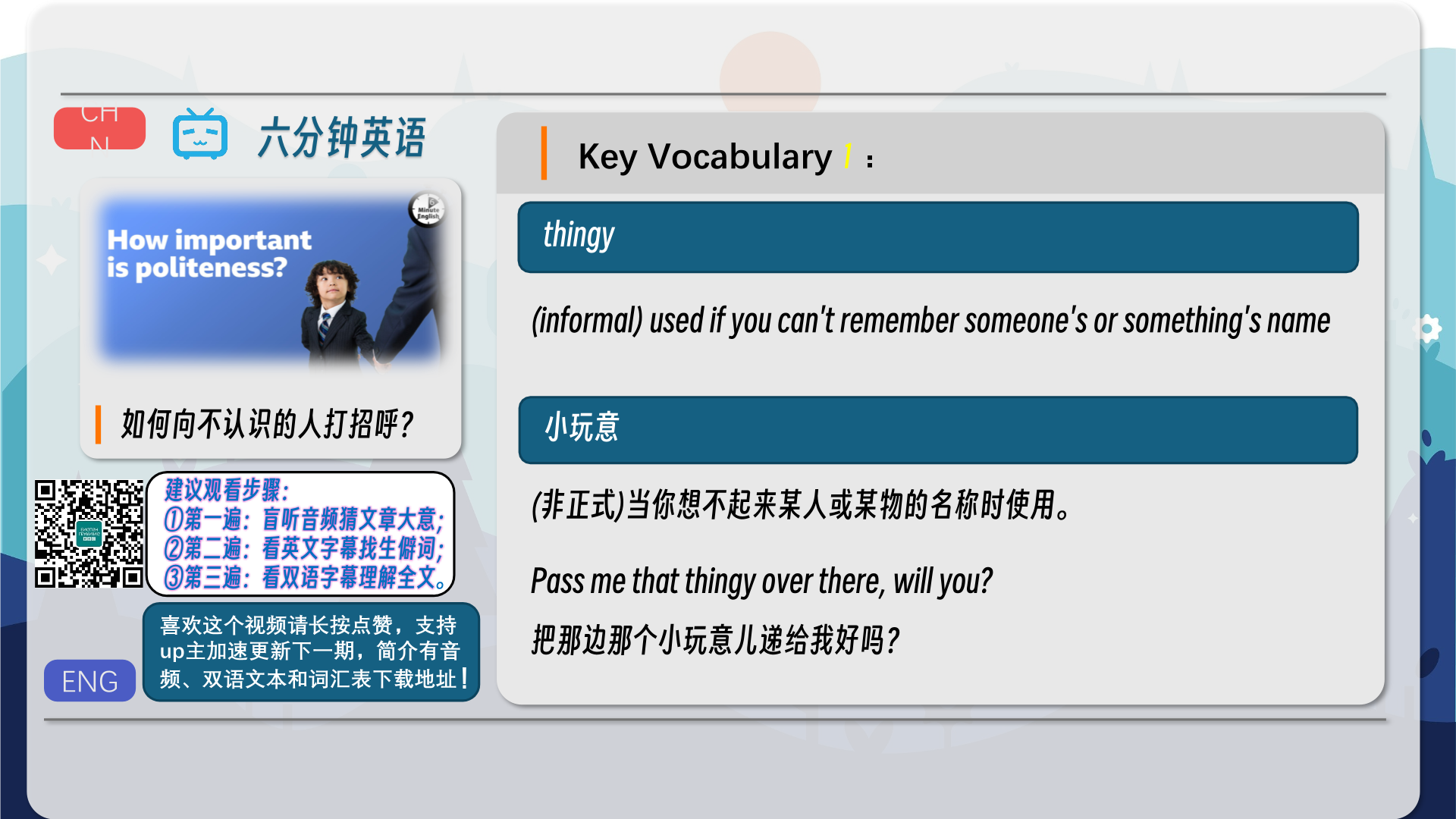
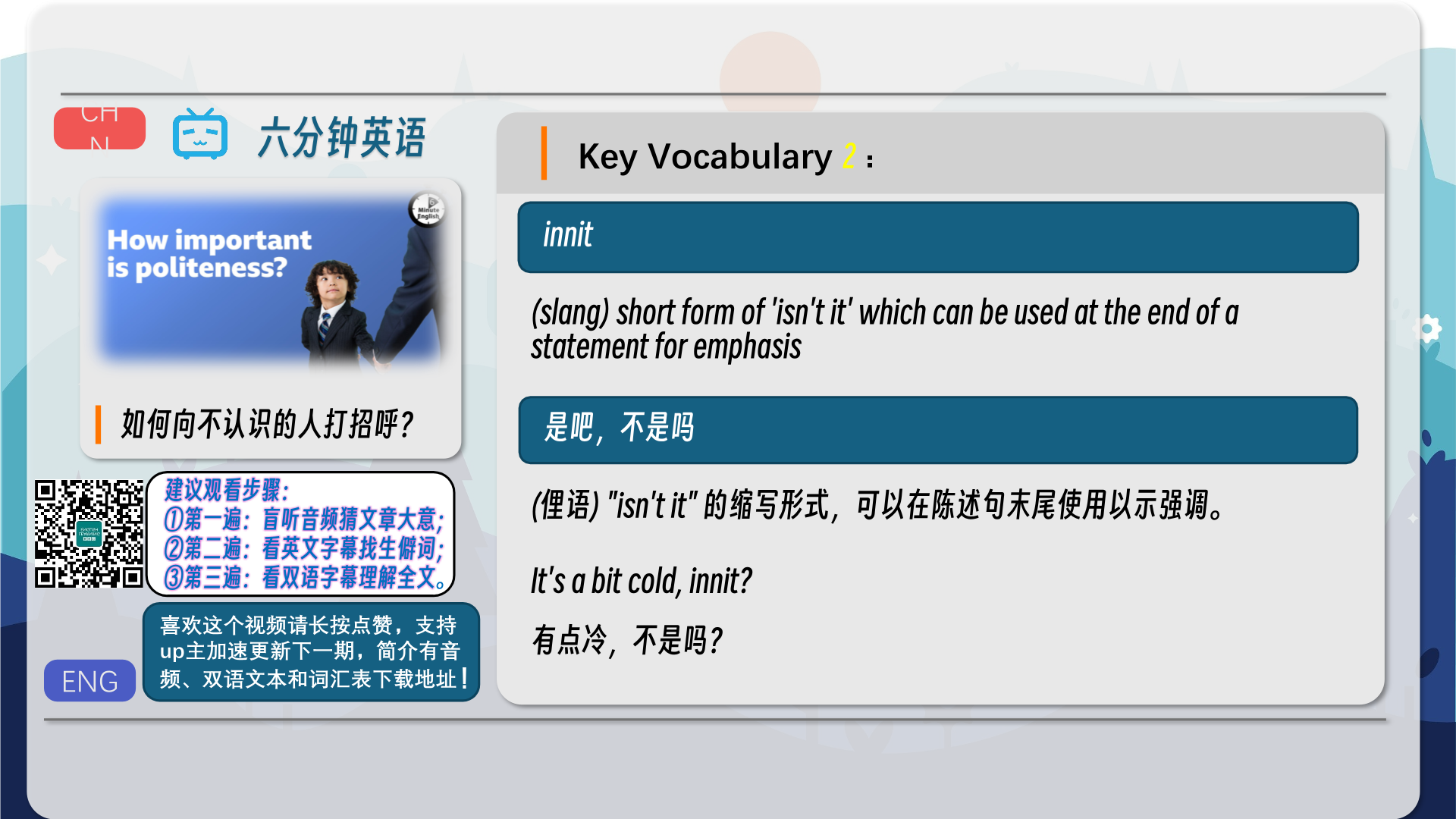
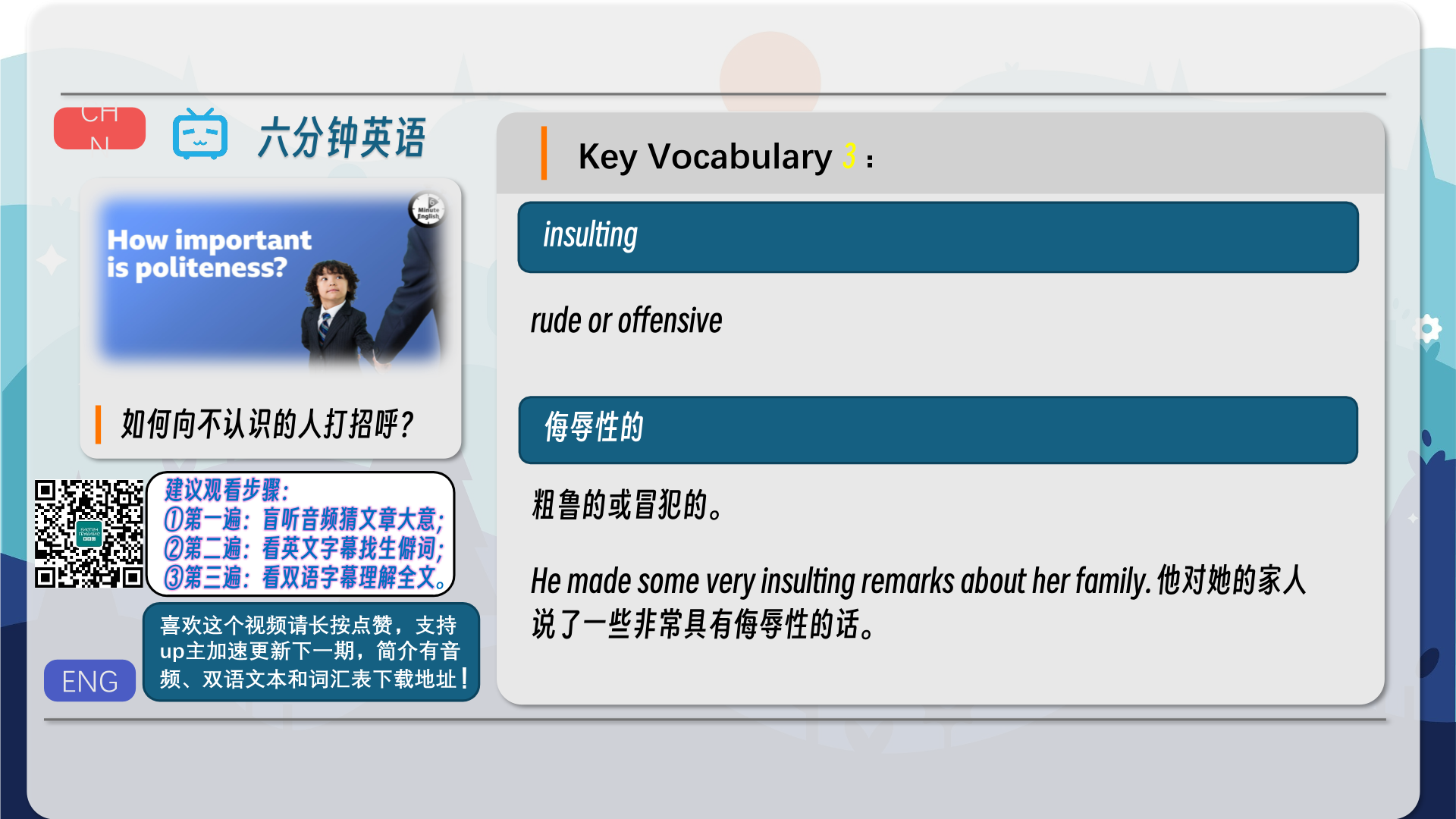
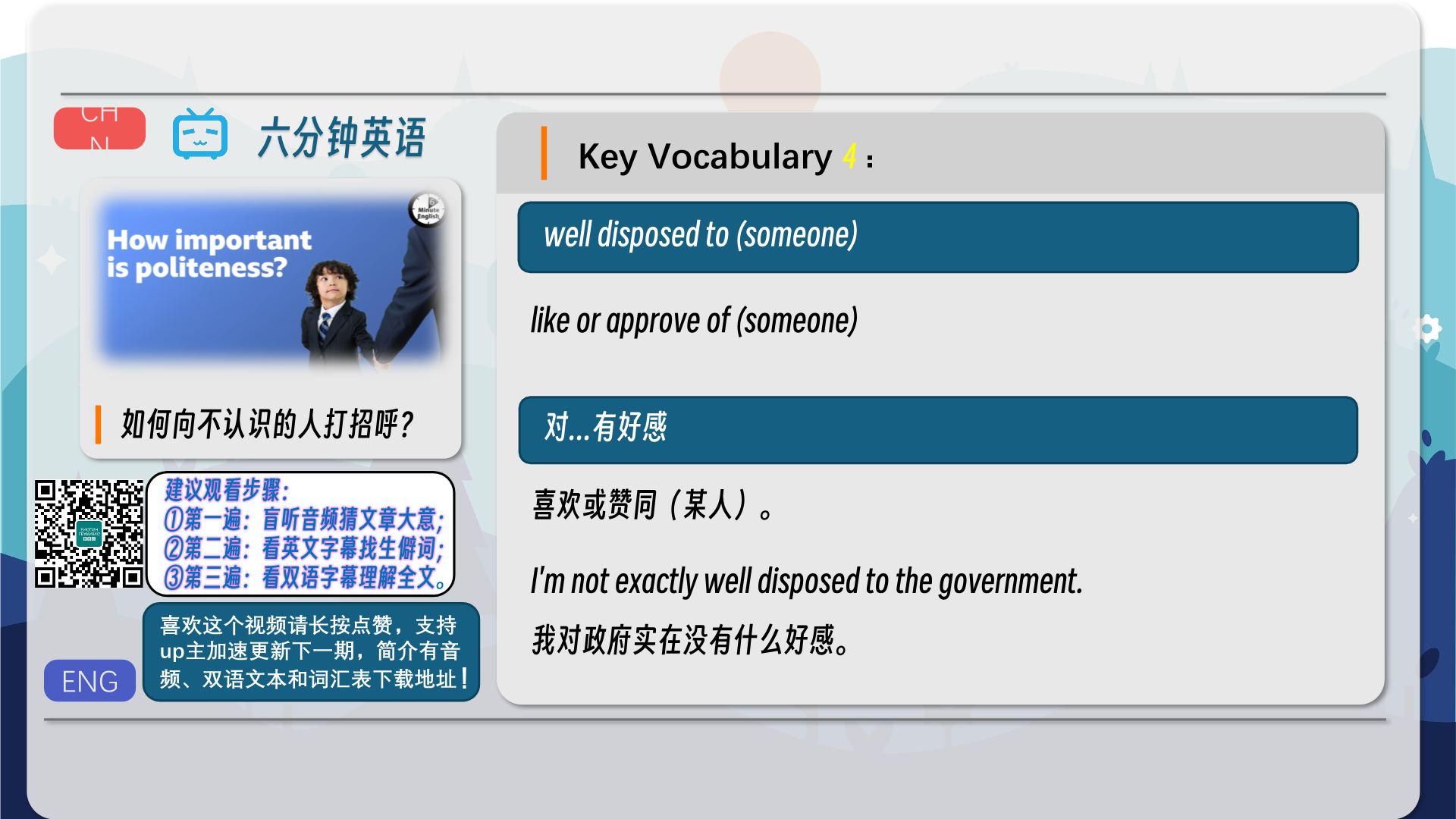
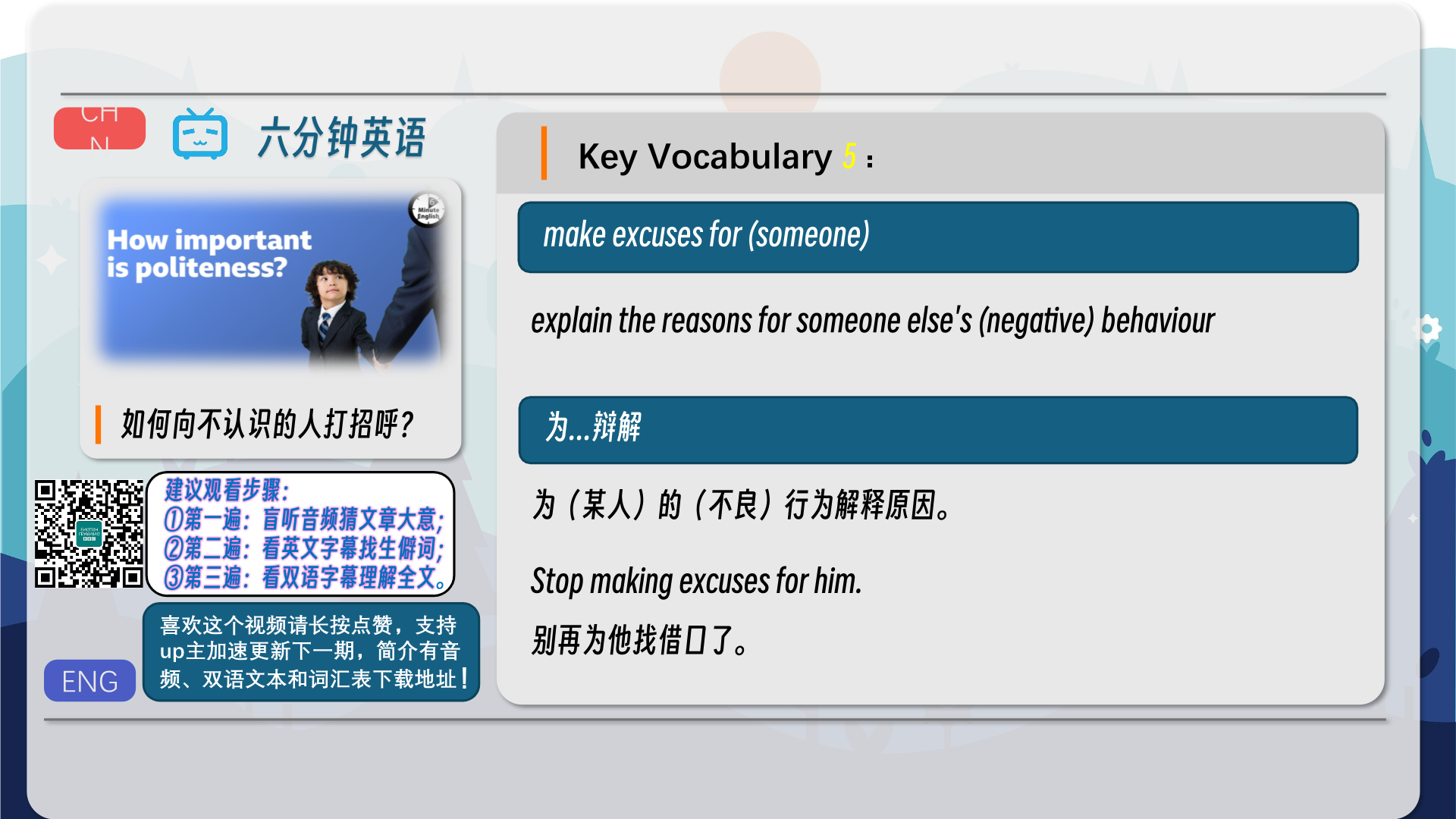
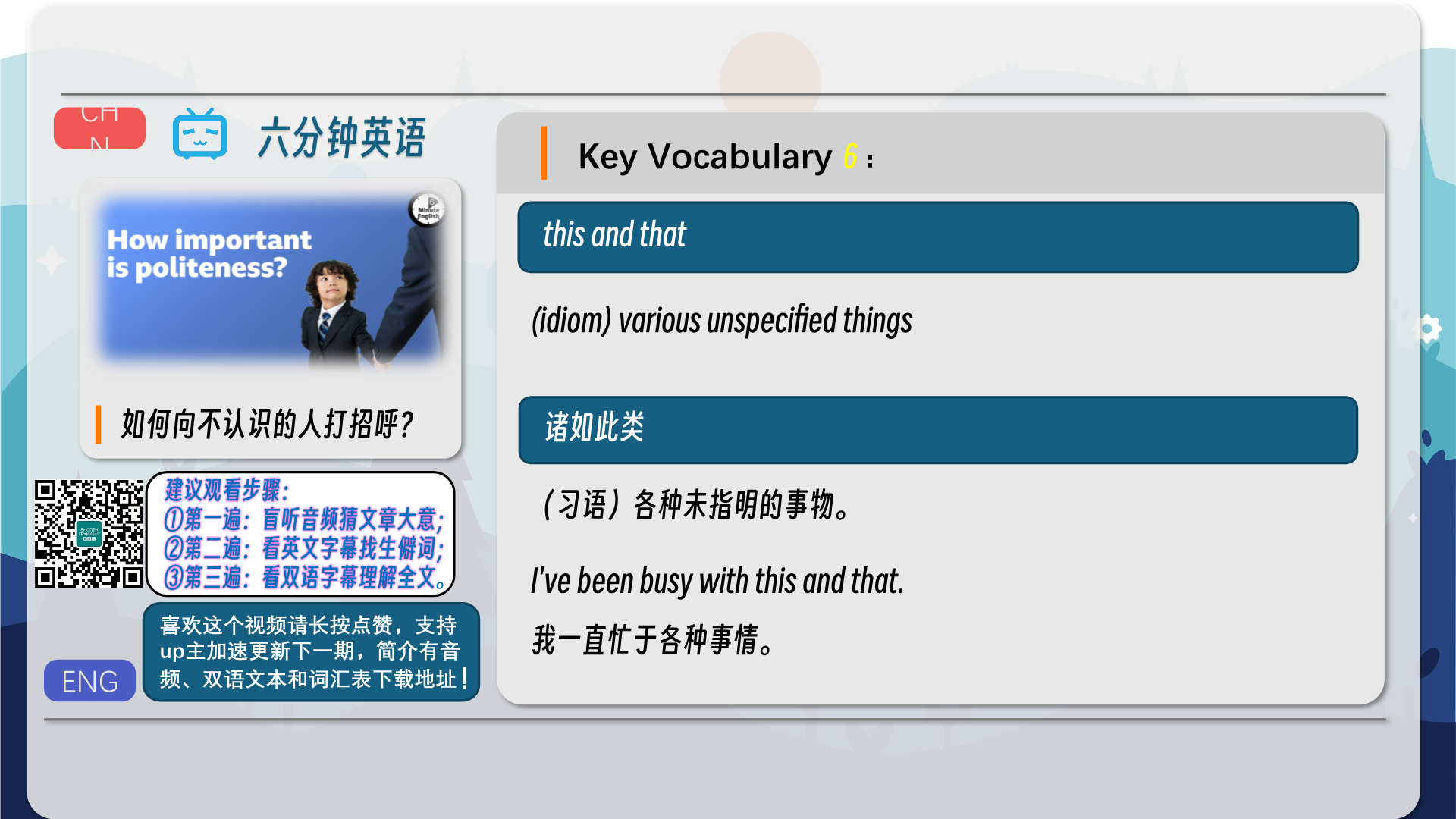
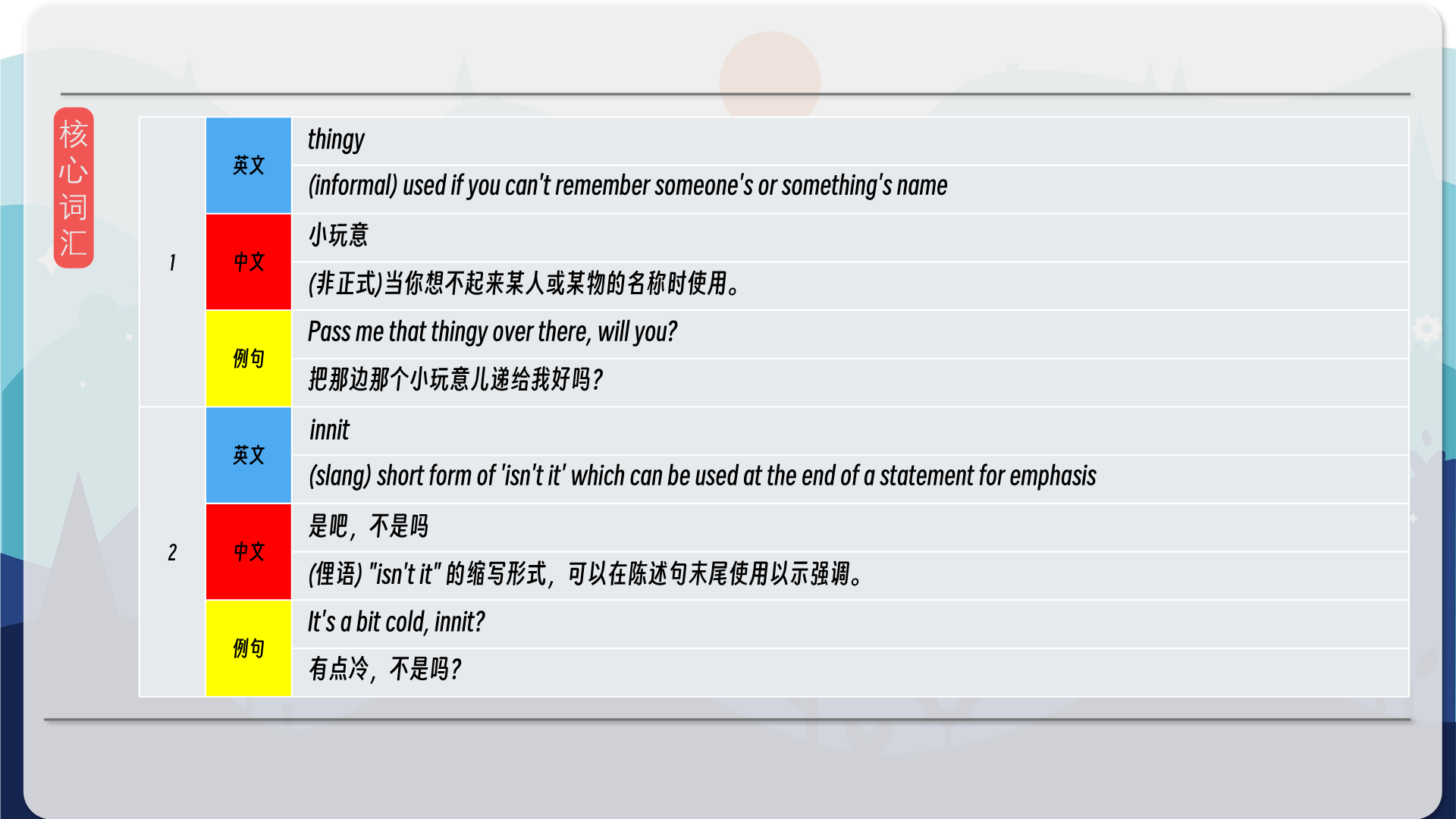

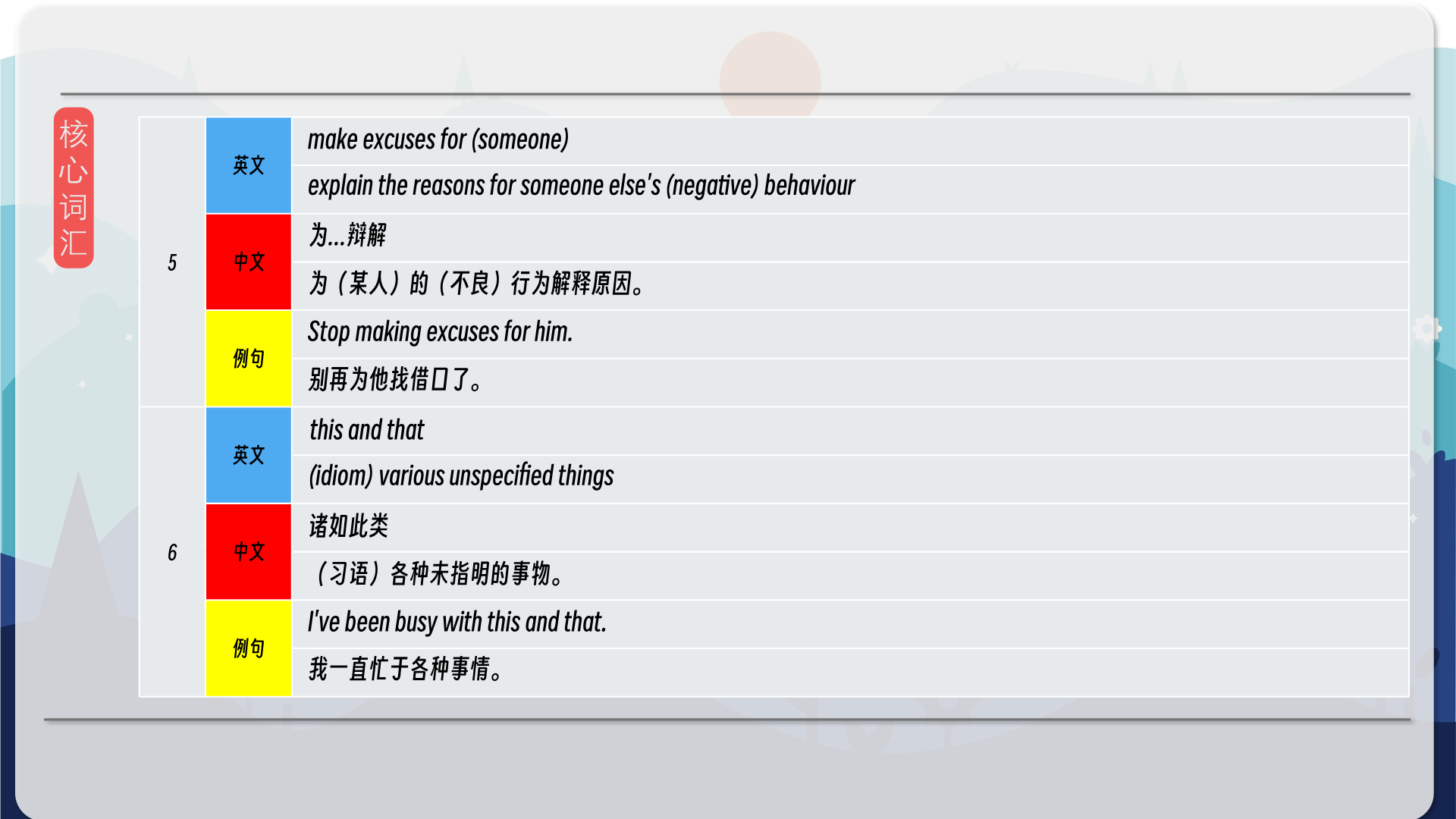
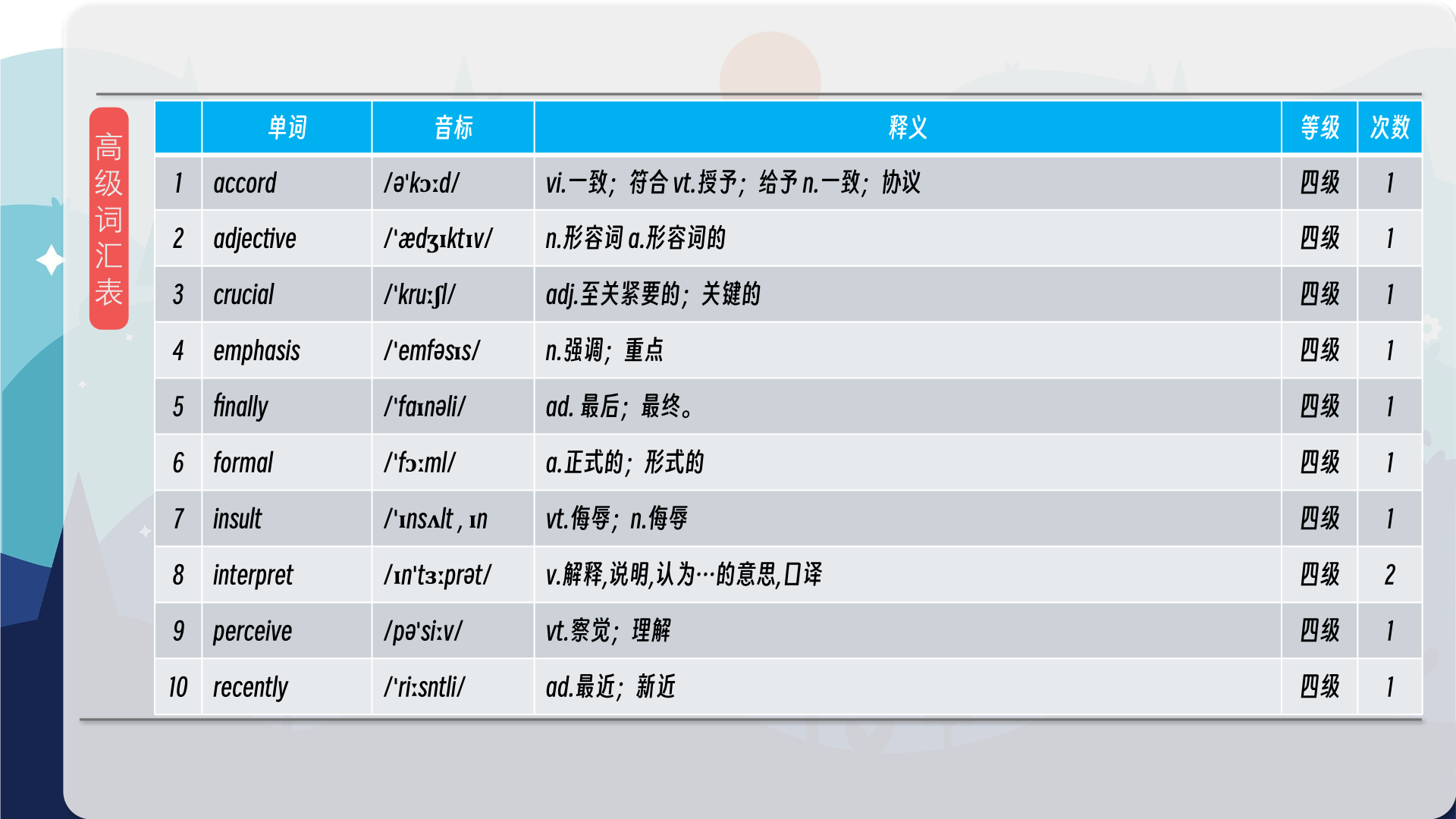
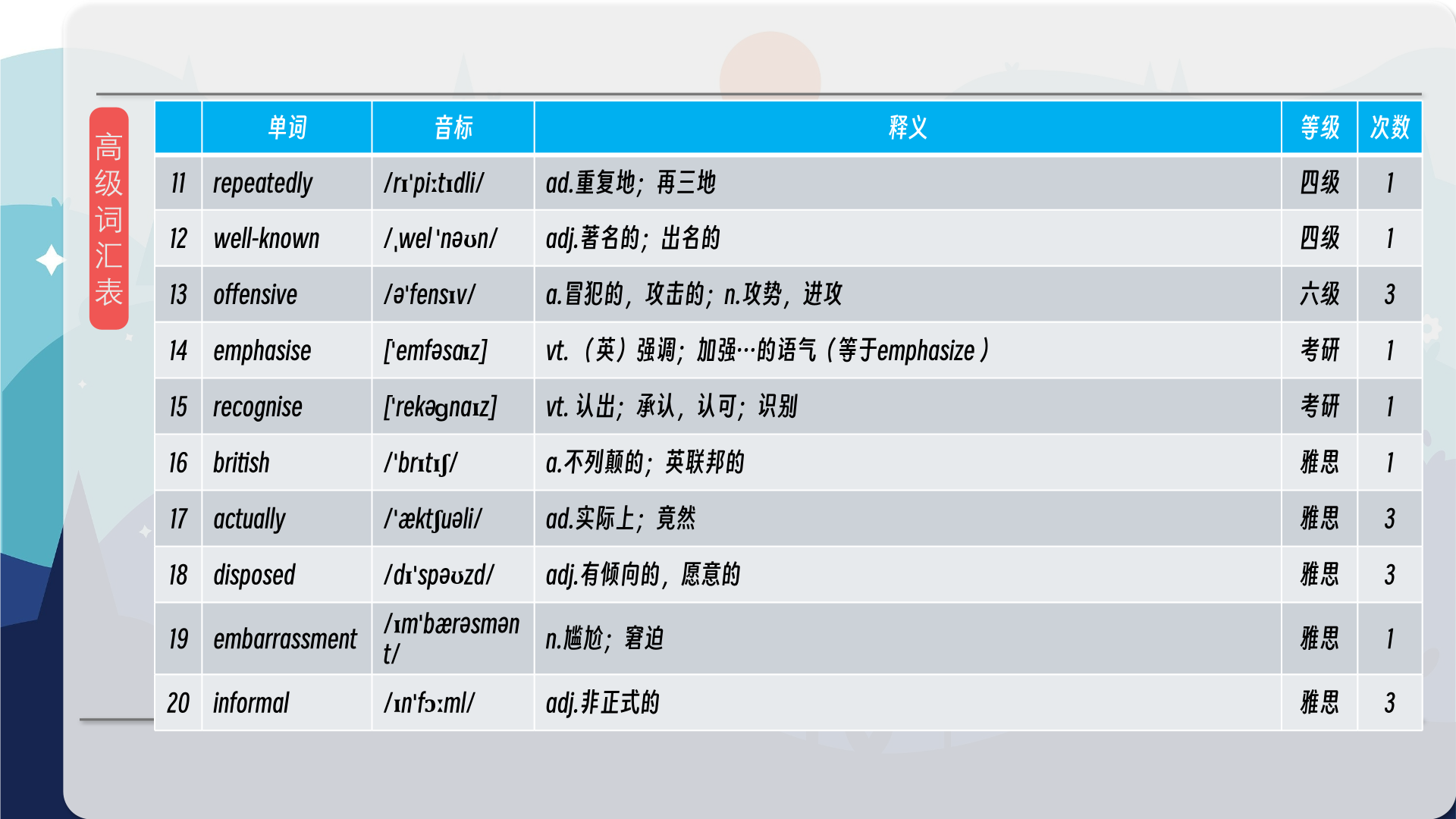


【核心词汇】
thingy
(informal) used if you can’t remember someone’s or something’s name
小玩意
(非正式)当你想不起来某人或某物的名称时使用。
Pass me that thingy over there, will you?
把那边那个小玩意儿递给我好吗?
innit
(slang) short form of ‘isn’t it’ which can be used at the end of a statement for emphasis
是吧,不是吗
(俚语) “isn’t it” 的缩写形式,可以在陈述句末尾使用以示强调。
It’s a bit cold, innit?
有点冷,不是吗?
insulting
rude or offensive
侮辱性的
粗鲁的或冒犯的。
He made some very insulting remarks about her family.
他对她的家人说了一些非常具有侮辱性的话。
well disposed to (someone)
like or approve of (someone)
对…有好感
喜欢或赞同(某人)。
I’m not exactly well disposed to the government.
我对政府实在没有什么好感。
make excuses for (someone)
explain the reasons for someone else’s (negative) behaviour
为…辩解
为(某人)的(不良)行为解释原因。
Stop making excuses for him.
别再为他找借口了。
this and that
(idiom) various unspecified things
诸如此类
(习语)各种未指明的事物。
I’ve been busy with this and that.
我一直忙于各种事情。
在公众号里输入6位数字,获取【对话音频、英文文本、中文翻译、核心词汇和高级词汇表】电子档,6位数字【暗号】在文章的最后一张图片,如【220728】,表示22年7月28日这一期。公众号没有的文章说明还没有制作相关资料。年度合集在B站【六分钟英语】工房获取,每年共计300+文档,感谢支持!